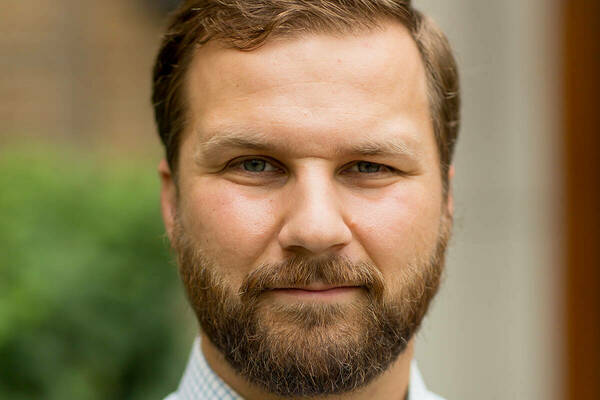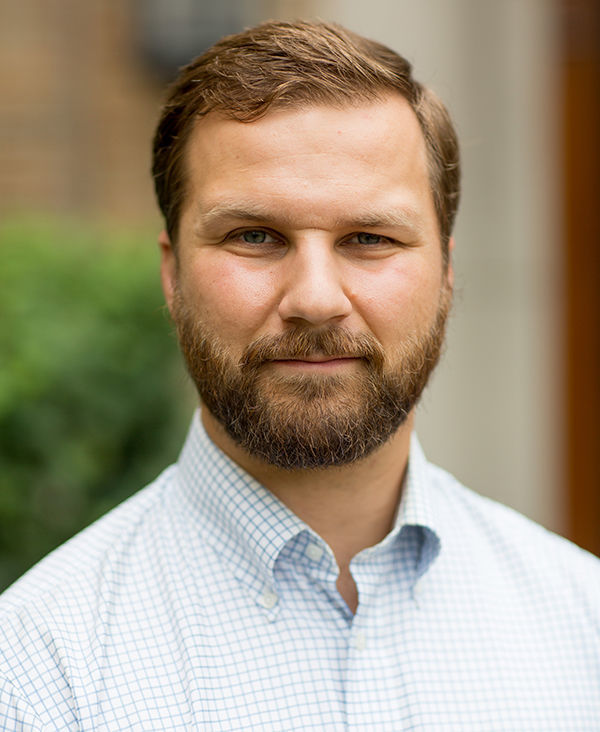

Jay David Miller, who received his Ph.D. in English from Notre Dame in spring 2020, has been awarded a fellowship from the American Council of Learned Societies for his project, Quaker Jeremiad.
As an ACLS Carl and Betty Pforzheimer Fellow in English and American Literature, Miller will spend a year at the McNeil Center for Early American Studies in Philadelphia. There, he will convert his dissertation to a manuscript by incorporating new archival research from the Historical Society of Pennsylvania, Swarthmore College’s Quaker collection, and other area libraries to better represent Quaker literary history.
Miller, currently a postdoctoral fellow in the Institute for Scholarship in the Liberal Arts, focuses his research on early American literature. His dissertation traces the development of Quaker rhetoric on agrarian labor and justice, examining the ways that rhetoric shifts from the beginnings of the Quaker movement in 17th-century England as it moves across the Atlantic and confronts agrarian issues like enslavement and indigenous dispossession.
“I explore how Quakers addressed those forms of injustice in early America, in part, by attending to their theological background and the religious ideas that inform that rhetoric over time,” Miller said. “I see the Quaker jeremiad as an alternative to the Jeffersonian agrarian tradition that’s associated with the United States, and I show that this Quaker tradition goes on to influence many writers in the 19th and even the 20th century.”
Because of its association with the Jeffersonian tradition, agrarianism is often seen as an idealized vision of agriculture that hides a problematic background of labor exploitation and injustice, Miller said. He seeks to offer a more complex view that explores how environmental justice can be achieved through agrarianism.
Miller is also exploring why theological writers tend to have a more holistic vision of the economy, by considering it in a broader moral context.
“One of the arguments in my book is how that theological context is able to inspire a form of agrarianism that is more attuned to questions of environmental justice,” he said. “In light of that, Notre Dame has provided a great context for working on this project because of the resources for the study of religion and theology here.”
“One of the arguments in my book is how that theological context is able to inspire a form of agrarianism that is more attuned to questions of environmental justice. In light of that, Notre Dame has provided a great context for working on this project because of the resources for the study of religion and theology here.”
Miller appreciated the support he received from his dissertation advisor, professor Sandra Gustafson — as well as the international opportunities he had as a Ph.D. student at Notre Dame.
Through the Center for the Study of Languages and Cultures, he received a Summer Language Abroad program grant to study German at the Goethe Institute in Germany so that he could better explore early American literature in the language.
And he participated in the Global Dome Exchange Program, cofounded by Patrick Griffin, the Madden-Hennebry Professor of History and director of the Keough-Naughton Institute for Irish Studies; and Elliott Visconsi, an associate professor of English, associate provost, and chief academic digital officer.
The program allows Ph.D. students from various disciplines to gather at Oxford University, the University of Edinburgh, and Notre Dame to workshop their dissertations and receive feedback from scholars.
“Elliott and Patrick did a great job of creating a stimulating academic community in these really amazing places in the United Kingdom,” Miller said. “I got to workshop my first chapter there, and it was invaluable to have that experience with other doctoral students and to hear from more experienced academics.”
Prior to the pandemic, Miller had secured a postdoctoral position at Heidelberg University, near Frankfurt, Germany for the 2020-21 academic year. When travel restrictions precluded him from assuming that role, the College of Arts & Letters was instrumental in helping him find his current position in ISLA through the 5+1 Postdoctoral Fellowship Program.
That role not only gave him a broader view of academic research, but also gave him valuable insight when he was preparing his own ACLS fellowship application.
“Especially in the context of the pandemic, it was great to have the support of the 5+1 program and to have several options for what I could do,” he said. “I’m really happy I was able to spend a year with ISLA. It was a great opportunity to get a lot of hands-on experience with research administration — and it certainly helped prepare me to write stronger grant proposals, too.”
“Especially in the context of the pandemic, it was great to have the support of the 5+1 program and to have several options for what I could do. I’m really happy I was able to spend a year with ISLA. It was a great opportunity to get a lot of hands-on experience with research administration — and it certainly helped prepare me to write stronger grant proposals, too.”
Originally published by at al.nd.edu on June 08, 2021.